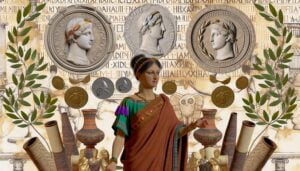Annie Name Meaning in English
The name Annie originates from the Hebrew name Hannah, signifying 'grace' or 'favor.' It developed through the Greco-Roman progression to Anna and then to its English diminutive form, Annie. Historically associated with prominent figures like Annie Oakley and Annie Besant, the name embodies resilience and influence.
Its literary significance is noteworthy in classic works such as 'Anne of Green Gables' and 'Little Orphan Annie,' reflecting themes of innocence and perseverance. Annie's enduring charm is apparent through its cultural and linguistic flexibility, making it a timeless choice for many.
Keep exploring to uncover more captivating aspects of this cherished name.

Key Takeaways
- Annie is derived from the Hebrew name Hannah, meaning 'grace' or 'favor.'
- The name evolved from Hannah to Anna and then to the diminutive form Annie.
- Annie symbolizes innocence, resilience, and grace in literature and popular culture.
- Famous individuals named Annie include Annie Oakley and Annie Leibovitz.
- Variations and nicknames include Ann, Nan, Annette, Anita, and Anya.
Origin of Annie
The name Annie originates from the Hebrew name Hannah, which means 'grace' or 'favor,' and has evolved through various linguistic and cultural transformations over centuries.
Rooted in ancient Hebrew traditions, the name Hannah was Latinized to Anna in the Greco-Roman world. This version was widely adopted across Christendom due to its biblical significance.
Over time, the name Anna further morphed into various diminutive forms, including the English 'Annie.' The linguistic journey from Hannah to Annie illustrates the fluid nature of names as they adapt to different phonetic and cultural environments.
The enduring popularity of Annie can be attributed to its simplicity and the universal appeal of its meaning, encapsulating notions of kindness and divine favor.
Historical Significance
Building upon its etymological roots, the name Annie also holds substantial historical significance, having been borne by notable figures and woven into the cultural fabric of various societies over centuries.
Originating from the Hebrew name Hannah, meaning 'grace' or 'favor,' Annie evolved as a diminutive form, particularly in English-speaking countries. Historically, the name gained prominence through figures such as Annie Oakley, a renowned sharpshooter in the American Old West, and Annie Besant, an influential British social reformer and theosophist.
The name's widespread use in 19th and 20th centuries reflects its enduring appeal and versatility. Annie's historical journey underscores its deep-rooted connection to themes of resilience and influence, making it a timeless choice across generations.
Literary References
The name Annie has been immortalized in various literary contexts, starting with its endearing presence in classic children's literature.
Its cultural significance was further cemented by the iconic play and musical 'Annie,' which brought the character's resilience and charm to a global audience.
Modern literary works continue to feature characters named Annie, underscoring the name's enduring appeal and versatility across genres and eras.
Classic Children's Literature
In classic children’s literature, the name Annie frequently surfaces as a symbol of innocence and resilience. It is often rooted in narrative traditions and historical contexts that emphasize the linguistic simplicity and endearing qualities of the name. This name, derived from the Hebrew name Hannah, meaning ‘grace’ or ‘favor,’ has been embraced in various literary works for its universal appeal and evocative warmth. The character of Annie represents the enduring themes of hope and strength in the face of adversity. This universal appeal has made it popular in works of literature like “Annie” by Thomas Meehan and “Little Orphan Annie” by Harold Gray. Similarly, the meaning of alice name, derived from the Germanic name Adalheidis, signifies nobility and grace, making it a fitting choice for fictional characters embodying these qualities.
Characters named Annie often embody themes of perseverance and purity, making them relatable and memorable for young readers.
- Anne of Green Gables by L.M. Montgomery
- Little Orphan Annie comic strip
- Annie and the Old One by Miska Miles
- The Annie Stories by Doris Brett
- Annie's Promise by Sonia Levitin
These works illustrate the timeless charm and narrative strength associated with the name Annie.
Iconic Play and Musical
Expanding upon the enduring allure of the name Annie in literature, its cultural resonance is further exemplified by the iconic play and musical 'Annie,' which has become a significant touchstone in theatrical history since its Broadway debut in 1977.
Based on the Harold Gray comic strip 'Little Orphan Annie,' this production encapsulates themes of optimism and resilience. The name Annie, rooted in Hebrew meaning 'grace' or 'favor,' is embodied by the character's unwavering hope amidst adversity.
This musical adaptation has not only solidified Annie's place in the annals of performing arts but also highlighted the name's linguistic heritage and its evocative power to convey innocence and strength, perpetuating its appeal across generations.
Modern Literary Mentions
Numerous contemporary literary works continue to draw upon the name Annie, leveraging its historical and linguistic roots to evoke themes of grace, resilience, and timeless innocence. Derived from the Hebrew name Hannah, meaning 'grace' or 'favor,' Annie has been a favored choice for authors aiming to imbue their characters with a sense of purity and strength. In modern literature, the name often appears in narratives exploring personal growth and overcoming adversity.
- Annie Wilkes in Stephen King's 'Misery' portrays complex psychological depth.
- Annie Cresta in Suzanne Collins' 'The Hunger Games' series symbolizes love and recovery.
- Annie John by Jamaica Kincaid reflects a coming-of-age journey.
- Annie Proulx is the author of 'The Shipping News' and 'Brokeback Mountain.'
- Annie Dillard is a Pulitzer Prize-winning author known for her reflective prose.
Famous People Named Annie
A rich tapestry of history and accomplishments is woven through the lives of famous individuals named Annie, each contributing uniquely to their respective fields. From literature to science, and the arts to activism, the name Annie has graced many influential figures. These individuals have left indelible marks on history, reflecting the name's enduring appeal and versatility. Below is a table highlighting some notable Annies and their fields of achievement:
| Name | Field of Achievement |
|---|---|
| Annie Oakley | Sharpshooting & Entertainment |
| Annie Leibovitz | Photography |
| Annie Besant | Theosophy & Activism |
| Annie Lennox | Music |
| Annie Jump Cannon | Astronomy |
The name Annie, with its roots in Hebrew meaning 'grace' or 'favor,' continues to inspire across generations.
Cultural Impact
The name Annie has left a significant imprint on cultural history, particularly through its representation in literature and media. From the beloved comic strip and subsequent musical 'Little Orphan Annie' to iconic characters in film and television, the name has become synonymous with resilience and charm.
This cultural saturation has cemented Annie's enduring popularity and recognizability, reflecting its deep linguistic roots and historical resonance.
Influence in Literature
Throughout literary history, the name Annie has been emblematic of resilience and kindness, often embodied by characters who leave a lasting cultural impact. Deriving from the Hebrew name Hannah, meaning 'grace' or 'favor,' Annie has graced numerous literary works. Its usage reflects a universal appeal and the archetypal virtues it represents.
Notable literary Annies include:
- Annie Sullivan in 'The Miracle Worker,' symbolizing perseverance and transformative education.
- Annie Wilkes in Stephen King's 'Misery,' presenting a darker, complex character study.
- Anne (Annie) Shirley in 'Anne of Green Gables,' epitomizing imagination and youthful exuberance.
- Annie John in Jamaica Kincaid's novel, exploring themes of adolescence and identity.
- Little Orphan Annie, highlighting resilience in adversity.
These characters underscore the name's versatility and enduring significance.
Popularity in Media
Name Annie has permeated various forms of media, symbolizing a wide array of attributes from resilience to complexity, thereby cementing its cultural significance.
Historically, the name Annie gained prominence with the 1885 poem 'Little Orphant Annie' by James Whitcomb Riley, which inspired the iconic comic strip 'Little Orphan Annie' and its subsequent adaptations. The linguistic simplicity and warmth of the name resonate with audiences, underscoring its timeless appeal.
In cinema, the name Annie is immortalized by the 1982 musical film 'Annie,' showcasing a spirited orphan whose optimism captures hearts. Additionally, characters like Annie Wilkes in Stephen King's 'Misery' demonstrate its versatility, embodying multifaceted personalities.
Consequently, the name Annie continues to influence and reflect cultural narratives.
Popularity Over Time
Starting from its origins in the 19th century, the name Annie has experienced fluctuating levels of popularity, influenced by cultural, social, and historical factors. Initially, the name gained prominence during the Victorian era, reflecting its roots in Hebrew and Old English, signifying grace and favor. Its popularity has seen various peaks and troughs over time, shaped by notable trends and events.
Key points influencing Annie's popularity include:
- 19th-century literature and poetry, where the name featured prominently.
- Early 20th-century immigration, bringing diverse naming traditions.
- Post-World War II baby boom, leading to a surge in traditional names.
- 1970s musical 'Annie', reigniting interest in the name.
- 21st-century resurgence, due to its timeless appeal and simplicity.
Understanding these patterns enriches our appreciation of the name's enduring charm.
Variations and Nicknames
The name Annie, often considered an affectionate diminutive of Anne or Anna, has cultivated a myriad of endearing nicknames and international variations throughout history.
In English-speaking countries, diminutives like Ann, Nan, and Nannie have been widely embraced, reflecting the name's enduring charm.
Globally, variations such as the French Annette, the Spanish Anita, and the Russian Anya illustrate the name's linguistic adaptability and cultural resonance.
Popular Annie Nicknames
While the name Annie has stood the test of time, its variations and nicknames reflect a rich tapestry of cultural, historical, and linguistic influences. These derivations often serve as a lens through which we can explore the evolution of names and their significance in different contexts.
Importantly, the name Annie can transform into numerous affectionate and familiar forms, each carrying its unique charm and historical baggage. Common diminutives and variations include:
- Ann: A classic and timeless alternative.
- Annie-Belle: Combining elegance with familiarity.
- Nina: A linguistically distinct yet related form.
- Nan: A vintage nickname with roots in medieval England.
- Annika: A Scandinavian variant, adding international flair.
These nicknames not only offer personalization but also underscore Annie's enduring appeal across eras and regions.
International Annie Variations
Expanding beyond familiar nicknames, the name Annie boasts a variety of international variations that highlight its linguistic versatility and cultural resonance globally. For example, in Russia, the name Annie is often translated as Anya, while in France it becomes Anne. These variations not only showcase the adaptability of the name across different languages, but also its ability to resonate with diverse cultures. In addition, the Sasha name meaning holds significance in various Slavic languages, often translating to “defender of mankind” or “warrior. ” This further emphasizes the multi-faceted nature of the name Annie and its global appeal.
From the French 'Anne' to the German 'Anneliese,' these iterations reflect historical and cultural nuances.
In Scandinavia, 'Annika' emerges as a popular form, rooted in ancient Norse traditions.
The Spanish 'Ana' and Italian 'Annia' underscore the name's enduring appeal across Romance languages.
Each variation carries unique phonetic elements while preserving the core essence derived from the Hebrew name Hannah, meaning 'grace' or 'favor.'
These global adaptations of Annie not only reveal the name's widespread acceptance but also its ability to seamlessly integrate into diverse linguistic frameworks, enriching its historical and cultural tapestry.
Annie in Modern Times
In contemporary society, the name Annie has seen a resurgence, reflecting both its timeless charm and evolving cultural significance. This revival is influenced by several factors rooted in historical context and linguistic appeal. Derived from the Hebrew name Hannah, meaning 'grace' or 'favor,' Annie carries a sense of enduring elegance and simplicity.
The name's popularity is buoyed by modern influences and cultural touchstones:
- Pop culture: Annie is frequently featured in films, television, and literature.
- Nostalgia: The name evokes a sense of classic charm and familiarity.
- Versatility: It serves well across different cultures and languages.
- Celebrity influence: Notable public figures named Annie contribute to its appeal.
- Ease of pronunciation: Its straightforward phonetics make it universally accessible.
Symbolism and Traits
The name Annie, imbued with historical and linguistic significance, symbolizes grace, favor, and timeless elegance, reflecting its Hebrew origins and enduring appeal across generations.
Derived from the Hebrew name Hannah, meaning 'favor' or 'grace,' Annie carries a legacy of benevolence and charm. Throughout history, the name has been associated with qualities of kindness, strength, and resilience. In literature and popular culture, figures named Annie often embody a spirited and nurturing nature, reinforcing these traits.
The name's simplicity and melodic quality further enhance its timeless allure. Linguistically, its two-syllable structure contributes to its versatility and ease of pronunciation, making it a beloved choice in various cultures and languages, thereby enriching its symbolic significance.
Choosing Annie for Your Child
When considering the name Annie for your child, one must appreciate its rich historical context, linguistic roots, and the enduring qualities it symbolizes. Originating from the Hebrew name Hannah, meaning 'grace' or 'favor,' Annie has retained its charm across centuries and cultures. Historically, it has been a popular choice due to its simplicity and elegance.
Choosing Annie offers several advantages:
- Historical Significance: A name with a legacy of grace and favor.
- Universal Appeal: Easily recognizable and pronounced worldwide.
- Enduring Popularity: Consistently favored through generations.
- Cultural Resonance: Familiar in various literary and artistic contexts.
- Linguistic Simplicity: Straightforward spelling and pronunciation.
In essence, Annie is a name that combines historical depth with timeless elegance.
Conclusion
Annie, a name steeped in historical significance, literary splendor, and cultural resonance, emerges as a beacon of timeless elegance. Its roots, tracing back through centuries, underscore a legacy of strength and grace.
The name's pervasive presence in literature and its adoption by numerous notable figures amplify its illustrious stature. Annie's modern-day relevance, coupled with its myriad variations, cements its position as an epitome of enduring charm and profound significance in the annals of nomenclature.






